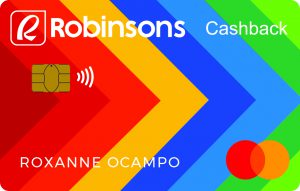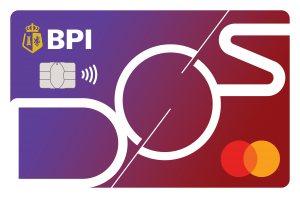Robinsons Bank
DOS Mastercard
Your Robinsons Bank DOS Mastercard is now BPI DOS Card
Quick Guide to Credit Card
What Is a Credit Card?
A credit card is a small plastic payment card that is issued by financial institutions like Robinsons Bank.
It allows a cardholder to borrow money, which they can then use to pay for products and services obtainable through online platforms or in brick-and-mortar establishments. It is one of the most popular payment solutions, in addition to being a common type of revolving credit account, one which imposes upon borrowers a maximum spending limit or credit availability. This amount of credit, to which the cardholder has access at any given time, is determined by the bank at its sole discretion and is usually based on the creditworthiness of the individual.
Credit cards work with the condition that cardholders pay back the amount they owe, as well as any other fees and charges that were agreed upon during the application. Borrowers are typically required by the bank to pay a minimum required amount, but they are also granted the discretion to pay any amount between the minimum required payment and the full balance. If the payment due date has passed and a cardholder chooses to carry credit card balance during the succeeding month, they will be charged interest on top of the outstanding balance, plus other relevant finance charges if applicable.
Credit Card Types and Categories in the Philippines
The types of credit cards available in the Philippines have multiplied in recent years.
Here are some of the most popular ones that are offered by financial institutions today.
Standard Unsecured Credit Cards
Most credit cards in the Philippines are unsecured. If a credit card is unsecured, it simply means that the bank does not require the cardholder to make a security deposit or to provide collateral. Typically meant only for people with acceptable or excellent credit scores, unsecured credit cards are harder to acquire because they require more stringent background checks and more documentary requirements.
Secured Credit Cards
In contrast to unsecured credit cards, secured credit cards typically require a security deposit or a collateral, thus reducing the default risk to the issuing financial institution. Default risk, as you may know, is the chance that a cardholder will not be able to make the needed payments for their credit debt obligations.
The inclusion of a security deposit also means that getting approved for a secured credit card is much easier compared to getting approved for an unsecured credit card. After all, the deposit prevents the need to provide a proof of income. In case of a missed credit card payment, a bank can simply deduct the balance owed from the cardholder’s account or cash deposit.
Balance Transfer Credit Cards
Balance transfer credit cards are usually issued by financial institutions that offer balance transfer programs. The balance transfer facility works by allowing qualified individuals to consolidate and move their existing debt to a new credit card, one that has a significantly lower interest rate. Sometimes, the interest rate can be as low as 0%, which helps in providing relief to debt-burdened cardholders. The bank will pay the existing balance to the original creditor(s), while the cardholder will pay the bank in multiple installments that can last several months, depending on the agreed-upon terms during the application.
Rewards Credit Cards
Rewards credit cards are offered by banks as a way to incentivize cardholders for making purchases with their cards. Some financial institutions may offer a percentage of cashback or cash rebate for every purchase made, while others allow cardholders to earn points that can be redeemed for a range of incentives—be it freebies, airline miles, or discounts in retail, dining, and hospitality establishments.
Robinsons Bank, for example, offers the UNO Mastercard and the DOS Mastercard credit cards, which allow cardholders to earn 1 point for every PHP 50 they spend using the card. Meanwhile, the DOS Mastercard credit card offers the added benefit of converting all of the cardholder’s purchases to a 2-month installment plan, with no added interest and no minimum amount required.
Credit Card vs. Debit Card: Which One Is Right for You?
So, how does a credit card differ from a debit card, you might ask?
In contrast to a credit card—which makes payments by taking out loans from a bank—a debit card deducts the money directly from the cardholder’s checking or savings account.
Because a debit card provides ready access only to money that you already have, it does force you to be more responsible when it comes to spending and using your card. After all, you can’t really spend money that you don’t already have, and you can’t possibly max out a non-existent credit line, which ultimately means you won’t be tempted to splurge. And if you’re the thrifty type of consumer to begin with, a debit card may also be the best payment option for you because there usually are little to no fees associated with maintaining one.
As you can imagine, debit cards are a great option for when you’re paying for small daily necessities that don’t cost a lot of money. Whether it’s for paying for utility bills, groceries, restaurant expenses, medicines, or something similar, a debit card lets you pay easily while also preventing you from overspending
However, as we’ll explain in the succeeding section, there are also many instances when opting to pay with a credit card may be a lot more advantageous for you.
Why Should You Get a Credit Card in the Philippines?
Aside from gaining access to the rewards previously mentioned, using a credit card offers other major advantages. Here are some of them.
A Credit Card Offers a Degree of Protection against Fraudulent Transactions
To be very clear, neither a credit card nor a debit card is fully risk-free. After all, fraudulent transactions continue to be a significant problem in the financial industry throughout the world. However, it’s what happens after the fact that will highlight the advantage of credit cards over debit cards.
It’s much easier to dispute fraudulent credit card charges. After all, any charge that is made with a credit card does not involve actual money yet until the balance is paid by the cardholder. Compare this to a debit card charge, which immediately deducts money from the cardholder’s account the moment a possibly fraudulent purchase is made. Even if the financial institution decides to reimburse the money, it could take a while before the cardholder gets their money back.
Having a Credit Card Allows You to Pay for Big-Ticket Purchases in Installments
Another advantage of using a credit card is that it allows you to stagger your payments for big-ticket purchases so that you don’t eliminate huge amounts of cash from your savings in one go. Whether it’s paying for a new gadget, a flight to Europe, or a vintage watch, a credit card allows you to pay for things you want while still leaving you with some money to use for your daily necessities.
Having a Credit Card Helps You Build Your Credit History
What’s the best way to get approved for new credit cards and other forms of important bank loans in the future? Why it’s by building a stellar credit history, of course. And one of the easiest ways to do this is by getting a credit card and being responsible and consistent when it comes to paying your dues.
By demonstrating that you can be depended upon to pay your credit card bills on time and consistently, you will be deemed creditworthy by your financial institution. Your bank, in turn, may become more willing to more easily approve your future loans with them—with lower interest rates and higher credit limits to boot.
How to Get a Credit Card in the Philippines
Qualifications
The qualifications for getting a credit card in the Philippines vary from bank to bank, but most financial institutions require prospective cardholders to:
- Be of certain age,
- Have a source of income,
- Maintain a certain minimum income, and
- Be a Filipino citizen or a permanent resident of the Philippines.
Robinsons Bank, for example requires applicants to be between 21 to 65 years of age (16 years old for supplementary cardholders), to have a minimum gross fixed annual income of PHP 180,000 if single and PHP 240,000 if married, and to have been a regular employee or a business owner for the last two years.
Other eligibility requirements include having a working landline, mobile phone, and email address, as well as access to a Robinsons Bank branch near where the applicant resides or works.
Requirements
The requirements for credit card application also differ depending on the bank, but most will require the following:
- Proof of identity,
- Proof of income for both employed and self-employed individuals, and
- A set of official documents for aliens working in the Philippines.
For its part, Robinsons Bank accepts any of the following as proof of identity: company ID card, passport, driver’s license, SSS ID card, TIN card, PhilHealth card, GSIS card, PRC card, Voter’s ID card, Unified Multi-Purpose ID card, and other government-issued ID cards.
As proof of income, employees are required by Robinsons Bank to submit their latest valid ITR form, a payslip for one month, and a certificate of employment, while self-employed applicants are required to submit their latest valid ITR form, audited financial statements for the last 2 years, a copy of Registration of Business Name, and 3 months’ worth of bank statements as an option.
Finally, Robinsons Bank also requires foreigners to submit copies of their valid visa or work permit, employment contract, and a valid passport (with Special Investors Resident Visa, Special Non-Immigrant Visa for PEZA investors and employees, or Visa with Executive Order No. 226). In addition, they are also required to submit a copy of their Alien Certificate of Registration (ACR), Immigration Certificate of Registration (ICR), or Alien Certificate of Registration Identification Card (ACR-1).
For a complete list of Robinsons Bank’s eligibility and documentary requirements visit the UNO Mastercard and DOS Mastercard pages.
Tips on Getting Approved for a Credit Card in the Philippines
Naturally, the only surefire way to get approved for a credit card application with your chosen bank is by ensuring that you meet all their eligibility requirements and submitting all the required documents.
Nevertheless, there are things you can do to tip the odds in your favor. Here are just some of them:
Demonstrate That You Have a Stable Source of Income
It goes without saying that you need a job—or you have to be self-employed—to be able to acquire a credit card. However, it takes more than being employed for a few months—or experimenting with a business venture in a similarly short amount of time—to convince your bank that you can handle a long-term credit commitment. As such, you will be well advised to stay in your job or run your business for at least two years to be able to demonstrate that you have the ability to pay any credit card debt you might incur.
Settle Your Existing Debts, and Build a Good Credit History
Another way to up your chances of being approved for a credit card application is to demonstrate that you are a financially responsible individual. You can do this by building a good credit history. Regularly settling any existing loans or debts before they are due and being responsible with other types of credit like housing mortgages and car loans all contribute to helping improve your creditworthiness in the eyes of financial institutions.
Open a Savings Account, and Get a Secured Credit Card
As previously mentioned, you have the option of getting a secured credit card if you have reason to believe that you will have difficulty acquiring a regular unsecured credit card. A lot of times, the only major requirement a bank will ask of you when getting such a card is to open a savings account, which they can use as collateral.
How to Stay Out of Credit Card Debt
A credit card can be a very useful tool for achieving your financial goals, but having one can also be disadvantageous if you are not responsible when it comes to using it.
Here are a few tips to help you make sure you don’t drown in credit card debt:
Never Miss Your Credit Card Payments, and Pay Your Dues in Full
Never underestimate how big your credit card debt can grow if you miss paying your monthly dues and they snowball one on top of the other. Paying your credit card balance in full and on time every month not only helps you avoid accumulating debt during the succeeding months, but you also get to avoid paying any associated interest and late payment fees.
Charge Only What You Can Actually Pay For
A credit card is not your personal access to the proverbial money tree or the duck that lays golden eggs. Whatever you charge to it, you’re going to have to pay for it eventually! Never be tempted to charge luxuries you really can’t afford. The best way to go about it is by setting yourself a credit limit that’s well-integrated into your monthly budget.
Set Up a Proper Emergency Fund
A credit card is no real substitute for a proper emergency fund. Imagine yourself falling ill and being up to your ears in debt simply because you didn’t have enough money to pay for your medicines or your hospital bills. Setting aside money for when real emergencies happen is another great way to avoid getting caught up in credit card debt.
How to Increase Your Credit Limit
An increased credit limit presents the obvious benefit of being allowed to borrow a bigger amount of money monthly.
However, the lesser-known but more important benefit of having a higher credit line is the possibility of being able to borrow a larger amount of cash while maintaining a lower credit utilization ratio. Generally, having a low credit utilization ratio is ideal for maintaining a good credit score. This is because statistically, people who consistently max out their credit cards are more likely to be unable to pay their debts in the future.
For example, someone with a credit limit of PHP 15,000 who consistently maxes out their credit card each month will have a credit utilization ratio of 100%. On the other hand, someone who has a credit limit of PHP 60,000 and who borrows the same amount of PHP 15,000 monthly will only have a credit utilization ratio of 25%.
Most credit card issuers will automatically increase the credit limit of individuals if they demonstrate responsibility in managing their credit card debts. This usually means consistently charging only reasonable amounts of money in relation to your credit limit and making sure to pay your due each month. Nevertheless, you can also request an increase from your bank, but the final decision will still be up to their discretion.
How Many Credit Cards Should I Keep?
Simply put, you can keep as many credit cards as your current financial situation allows.
However, you should also take care not to apply for too many cards in a short span of time, as this may be seen as suspicious activity and hurt your creditworthiness. But it can’t be denied that having multiple credit cards can help streamline your bookkeeping. For example, you can separate personal from business-related expenses by using a different credit card for each. If you have more than two, you can also charge different expenses to different cards for easier accounting and even have a dedicated credit card for long-term installment payments. However, remember that having more credit cards also increase the risk of missing payments if you start losing track of your spending.
What Are Credit Card Points?
As discussed above, financial institutions that issue reward credit cards to customers often maintain rewards programs in which users can earn credit card points for purchases worth a certain amount.
For example, every PHP 50 could earn a credit card user 1 point, which they can then use to redeem incentives depending on what kind of rewards are tied to their card. One point could represent one airline mile, a partial rebate or cashback, or a discount for a product or service.
How to Maximize Credit Card Rewards
Having a credit card allows you to enjoy perks you normally wouldn’t if you paid with a debit card or with cash instead.
However, getting a credit card for every imaginable reward out there can be unsustainable. After all, as we’ve previously discussed, having too many cards could leave you incurring multiple debts that you could have a hard time paying.
Thankfully, you can more wisely maximize credit card rewards by first taking stock of where most of your spending goes. By studying your own spending habits, you can determine the most appropriate cards that come with the perks you’ll find most useful. For example, you can have a credit card dedicated to traveling expenses to help you better collect airline miles. Meanwhile, you can also have separate credit cards to help you collect points from dining or shopping. Indeed, what’s important here is that you’re able to focus on reward programs that line up with how you spend your money.
Does the Philippines Have a Credit Score System?
Unlike with countries such as the United States, the Philippines currently does not have a unified credit score system.
Instead, most banks depend on information from their databases in conjunction with those sourced from reputable third-party sources. Still, you shouldn’t use this lack of centralization as a reason to be cavalier with your spending.
Because banks and financial institutions share information, it is still in your best interests to maintain a high creditworthiness rating. What’s more, doing this can even improve your chances of successfully securing a loan or even applying for a new credit card in the future.
What Happens When I Miss a Credit Card Payment Deadline?
Any unpaid amount for your latest billing statement will be subject to finance charges.
For both UNO and DOS credit cards, this will be equal to 3.50% of your remaining average daily balance (ADB). Additionally, if your remaining unpaid balance is less than the minimum amount indicated in your latest billing statement, you will incur a late payment fee of PHP 600.00. This is on top of any finance charges that may have already been levied. Remember that these will be carried over to the next billing statement if left unpaid and will be subject to the same charges. So make sure to avoid late payments to keep your credit card bill from getting out of hand.
What Happens When I Stop Paying My Credit Card Bills?
After failing to pay your credit card bills for a certain amount of time, you may be declared as having defaulted on your debts.
. In the Philippines, a cardholder with unpaid credit card debts may be liable for a civil suit. However, the bank will likely turn over the responsibility of collecting your outstanding debt to a third-party collection agency. Their representatives will then take over the task of reminding you to pay your credit card debt.
Moving forward, the main inconvenience caused by a default will be your inability to access credit from reputable lending institutions. And even if you end paying back your debt in full, your non-repayment may remain on the bank’s system and negatively affect all loan requests for the foreseeable future.
How Can a Credit Card Help My Business?
For business owners, having a credit card can allow you to jump on any opportunity for growth and expand quickly whenever necessary.
Indeed, the resulting boost to your purchasing power should allow you to spend on whatever you might need should the opportunity to scale up suddenly present itself. This might include additional furniture, tools, and equipment that your team might need to expand.
How Can a Credit Card Improve My Quality of Life?
As long as it’s used wisely, a credit card will prove invaluable for purchasing items that could overstretch your budget if paid for in cash.
But even if you don’t count yourself as a heavy spender, credit cards also have other benefits beyond being able to buy things you might otherwise not be able to afford. With most reputable online and brick-and-mortar stores now accepting credit card payments, having a credit card can provide added convenience while reducing the need to carry lots of cash. And by maintaining your credit card in a responsible manner, you can build a positive credit history that should help you secure bigger loans in the future.





